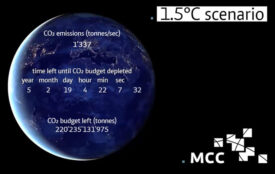Google Data Shows Public Interest in Conservation Is Rising
The public’s interest in conservation is rising, according to a new analysis led by Princeton University.
Based on an adapted version of Google Trends — which tracks user searches on Google — the results show that people search for conservation just as often as they do for climate change.
While the researchers cannot pinpoint exactly why people searched the terms they did, they are confident the results point to the public’s interest in both topics. The authors of the report, published in Frontiers in Ecology and the Environment, urge conservation scientists to nurture this growing interest and transform it into actual support for conservation.
“Some people have expressed concern that when the public began to identify climate change as the single most important environmental threat, interest in other environmental issues diminished, but we find the opposite is true,” said lead author Zuzana Burivalova, a postdoctoral research fellow in Professor David Wilcove’s lab at Princeton University’s Woodrow Wilson School of Public and International Affairs.
“We think our work highlights the value of presenting objective, evidence-based findings about conservation in an accessible, engaging and relatable way. This is especially crucial in a time of growing political polarization and misinformation,” said Wilcove, professor of ecology and evolutionary biology and public affairs and the Princeton Environmental Institute.
Burivalova, a tropical forest ecologist and conservation scientist, began this side project because she had been disappointed to hear that public interest in conservation was declining. She wondered if the disinterest was because of the terminology scientists used — like the word “biodiversity,” for example, which may be confusing to some — or whether climate change trumped all other environment-related searches.
Under the guidance of Wilcove and with the help of Rhett Butler, founder of environmental news outlet Mongabay, Burivalova turned toward Google Trends, a website by Google that analyzes top search queries. Often used for business and advertising, Google Trends has also been employed to study local health outbreaks like the flu or chicken pox.
The researchers used data provided by Google Trends, which they combined with their own model of estimates regarding how the total number of searches changed over time, information not currently provided by Google. They studied monthly search results between 2004 and 2017.
In addition to the terms “conservation” and “biodiversity,” the researchers also included related terminology like “environmental protection,” “ecotourism,” and “national parks,” among others. To explore the correlation between searches for climate change and conservation, they compared the terms “climate change” and “global warming” with “biodiversity,” “extinction” and “endangered species.”
The results show online interest in conservation (around 110,000 searches per month) is of a similar order of magnitude to interest in poverty, which is around 165,000 searches per month. Interestingly, there was a significant rise in internet searches for “conservation” between 2004 and 2017 in many East African countries as well as India and Nepal.
Across the time span studied, public interest in climate change and global warming began to rise in 2007, possibly due to the 2006 release of “An Inconvenient Truth,” a documentary about climate change, the researchers posit. During this time, there was also a general rise in individual donations to the Nature Conservancy and the World Wildlife Fund.
“Of course, we understand interest does not necessarily equal support,” said Burivalova. “So academics and conservation practitioners should continue to explore new ways of communicating scientific findings, for example through collaborations with educators, journalists, storytellers and more.”
The study points out two of its major limitations. Google Trends is biased toward developed countries with access to the internet. The data available also doesn’t include user’s motivation for searchers.
- The paper, “Analyzing Google search data to debunk myths about the public’s interest in conservation,” was published in the November print issue of Frontiers in Ecology and the Environment. Funding for this work was provided by the John D. and Catherine T. MacArthur Foundation.








